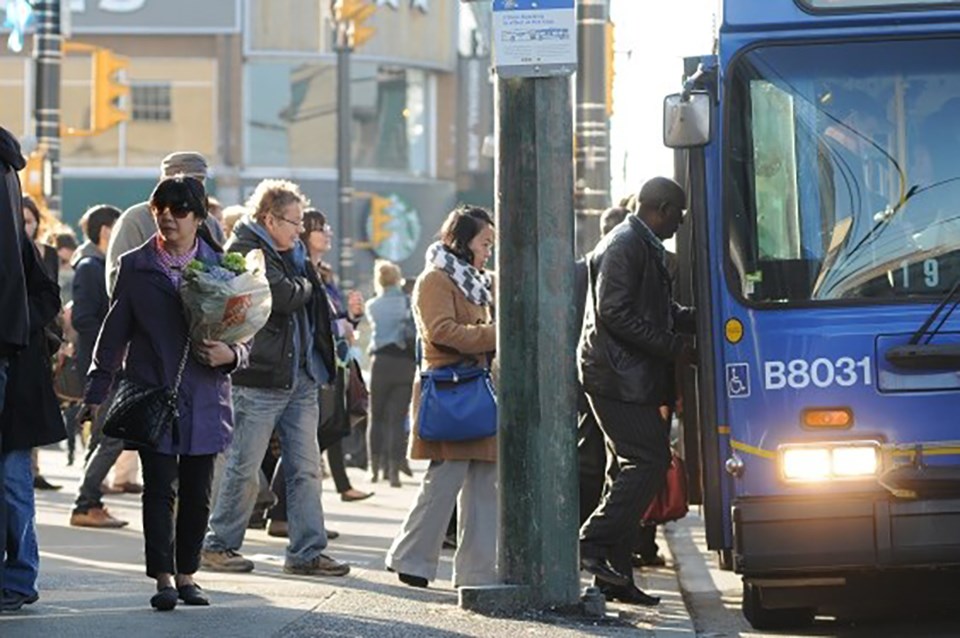TransLink is reporting a recent spike in ridership and anticipating more crowded buses this fall as an indication of an accelerating post-pandemic recovery across the region.
And it’s this recovery that is prompting elected officials overseeing the regional transportation authority to re-table its funding demands on the federal government.
TransLink CEO Kevin Quinn spoke to the Mayors’ Council meeting Thursday in Burnaby, claiming system-wide ridership over the last two weeks of May reached 88 per cent of 2019 levels. Drilling down in even more detail, Quinn said weekend ridership reached 99 per cent of pre-pandemic levels.
Furthermore, the sheer number of unique riders has fully rebounded, said Quinn, with about 400,000 people tapping their fare cards last month.
The remaining gap is largely to do with the fact these riders are not using transit as frequently during the weekdays, with Quinn suggesting hybrid work-from-home models continue to impact revenues.
Quinn said TransLink continues to study how people are interacting with public transit following the lifting of pandemic restrictions.
TransLink data shows ridership rebound has varied across the Lower Mainland, with Surrey and Langley experiencing a 15 per cent increase since 2019 and Maple Ridge and Pitt Meadows showing a six per cent uptick. TransLink said the 15 per cent increase in Surrey and Langley has outstripped its 12 per cent increase in bus service, to date.
But the region’s more densely populated cities continue to show significant drop-off from 2019, including 91ԭ�� (24 per cent), Richmond (11 per cent) and Burnaby and New Westminster (22 per cent). The North Shore remains 16 per cent below 2019 levels.
Still, ridership has increased by 20 per cent in 91ԭ��, between March 2022 and March 2023.
Despite ridership remaining lower than 2019 in 91ԭ�� and at the University of British Columbia, one third of bus trips there during the evening rush hour are overcrowded this year, whereas one quarter of bus trips in Surrey and Langley are likewise so, noted Quinn. He anticipates overcrowding will get worse come fall.
The council has gone cap in hand to the federal government, after receiving a $479-million provincial government subsidy in March to cover anticipated losses over the next three years.
“The year-over-year growth in our region is extremely high and demonstrates the urgency of action needed by governments,” said Mayor Brad West, chair of the Mayors’ Council.
“We had productive conversations in Ottawa last month. Everyone agreed expanding transit is critical to improving quality of life, addressing affordability and meeting emission reduction targets. We are hopeful our federal counterparts will come to the table alongside the Province of B.C. and local leaders to help make this plan a reality,” said West.
The council’s plan calls for expedited permanent federal funding.
The council has made no mention of raising property taxes and TransLink’s report shows it derives the least amount of revenue from property taxes than most of its 91ԭ�� counterparts.
TransLink says it only derives about 25 per cent of its funding from property taxes, which is a much lower rate than Calgary (59 per cent), Greater Toronto (35 per cent) or Montreal (50 per cent).
TransLink conversely gets about 30 per cent of its revenue from vehicle and fuel taxes.
Anmore Village Mayor John McEwan said at the meeting more reliance on property taxes may occur as fuel tax revenues decline over time.
TransLink observer Nathan Davidowicz said TransLink continues to charge more per trip, as compared to other major 91ԭ�� cities, citing the 91ԭ�� Urban Transit Association Factbook of 2019.
Davidowicz noted that TransLink is increasing its fares (by 2.3 per cent) on July 1.



